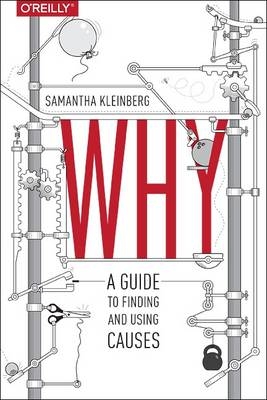
Why
O'Reilly Media (Verlag)
978-1-4919-4964-1 (ISBN)
This book helps you think about causality in a structured way: What is a cause, what are causes good for, and what is compelling evidence of causality? Author Samantha Kleinberg shows you how to develop a set of tools for thinking more critically about causes. You’ll learn how to question claims, identify causes, make decisions based on causal information, and verify causes through further tests.
Whether it’s figuring out what data you need, or understanding that the way you collect and prepare data affects the conclusions you can draw from it, Why will help you sharpen your causal inference skills.
Samantha Kleinberg is an Assistant Professor of Computer Science at Stevens Institute of Technology, where she works on developing methods for understanding how systems work when they can only be observed - and not experimented on. Currently, these methods are being used to understand causes of secondary complications in stroke patients (funded by an NIH/NLM R01 grant) and to predict changes in glucose in people with diabetes. She introduced courses on causal inference and health informatics at Stevens, and enjoys helping students cope with the challenges of real-world data. She received her PhD in computer science and B.A. in computer science and physics all from New York University, and previously held an NSF/CRA Computing Innovation Fellowship at Columbia University.
Chapter 1Beginnings: Where do our concepts of causality and methods for finding it come from?
What is a cause?
How can we find causes?
Why do we need causes?
What next?
Chapter 2Psychology: How do people learn about causes?
Finding and using causes
Blame
Culture
Human limits
Chapter 3Correlation: Why are so many causal statements wrong?
What is a correlation?
What can we do with correlations?
Why isn’t correlation causation?
Multiple testing and p-values
Causation without correlation
Chapter 4Time: How does time affect our ability to perceive and reason with causality?
Perceiving causality
The direction of time
When things change over time
Using causes: It’s about time
Time can be misleading
Chapter 5Observation: How can we learn about causes just by watching how things work?
Regularities
Probabilities
Simpson’s paradox
Counterfactuals
The limits of observation
Chapter 6Computation: How can the process of finding causes be automated?
Assumptions
Graphical models
Measuring causality
Now what?
Chapter 7Experimentation: How can we find causes by intervening on people and systems?
Getting causes from interventions
Randomized controlled trials
When n=you
Reproducibility
Mechanisms
Are experiments enough to find causes?
Chapter 8Explanation: What does it mean to say that this caused that?
Finding causes of a single event
Explanation with uncertainty
Separating type and token
Automating explanation
Causality in the law
Chapter 9Action: How do we get from causes to decisions?
Evaluating causal claims
From causes to policies
Chapter 10Onward: Why causality now?
The need for causality
Key principles
A well-stocked toolbox
The need for human knowledge
Appendix Notes
Chapter 1. Beginnings
Chapter 2. Psychology
Chapter 3. Correlation
Chapter 4. Time
Chapter 5. Observation
Chapter 6. Computation
Chapter 7. Experimentation
Chapter 8. Explanation
Chapter 9. Action
Chapter 10. Onward
| Erscheint lt. Verlag | 5.1.2016 |
|---|---|
| Zusatzinfo | black & white illustrations |
| Verlagsort | Sebastopol |
| Sprache | englisch |
| Maße | 155 x 227 mm |
| Gewicht | 418 g |
| Einbandart | kartoniert |
| Themenwelt | Geisteswissenschaften ► Philosophie ► Logik |
| Mathematik / Informatik ► Informatik ► Theorie / Studium | |
| Schlagworte | causes • Philosophie • Ursachen • Ursache-Wirkung |
| ISBN-10 | 1-4919-4964-3 / 1491949643 |
| ISBN-13 | 978-1-4919-4964-1 / 9781491949641 |
| Zustand | Neuware |
| Informationen gemäß Produktsicherheitsverordnung (GPSR) | |
| Haben Sie eine Frage zum Produkt? |
aus dem Bereich


